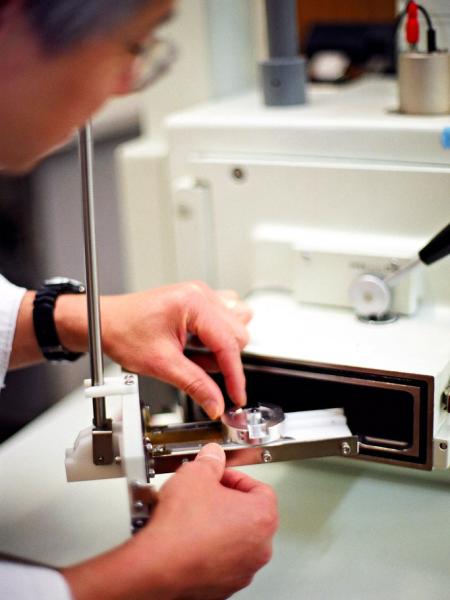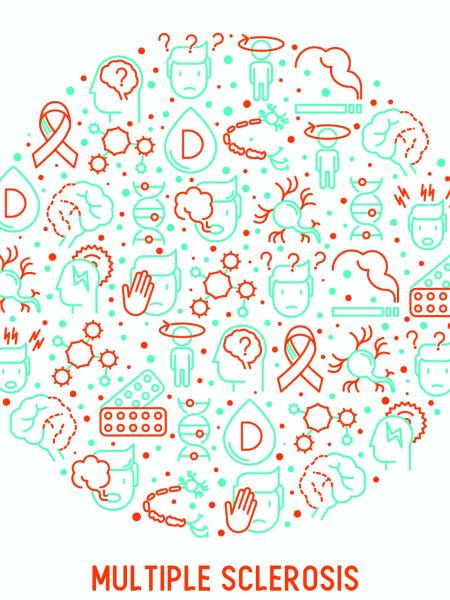Research Updates
Our Health in Our Hands brings together several research disciplines to develop innovative approaches and technologies to understanding and monitoring disease, with the aim of enhancing treatment precision, and improving patient outcomes. The program is underpinned by four research streams, and close collaboration between researchers, clinicians and individuals living with multiple sclerosis and diabetes.
Sensor Update
The OHIOH Sensor Program were able to resume work on campus in the first week if June. They are excited and very motivated to restart their experimental research activities after a long period of interruption due to bushfire smoke, hail storm damage and Covid-19 working from home arrangements.
In the previous two months, they have been expanding their biosensor design capabilities with a set of simulation tools, and prepared a submission for an NHMRC idea grant on the use of the miniaturized biosensor platforms, developed in OHIOH, for point-of-care COVID-19 serology tests. Preliminary findings of the last two weeks show some promising results, provide a first proof-of-principle of their innovative sensing concept.
On another front, the first series of OHIOH Sensor Program PhD students have successfully presented their TPR, and are now proceeding full force ahead with their research program. We have also seen the conclusion of the third Capstone student project focused on the development of breath analysis sensors for diabetes diagnostics. Despite the limitation imposed by working from home, the Capstone student team has further advanced the design of our sensor prototype, achieving further miniaturization of device size and decrease of power consumption.
Diabetes non-invasive management
The OHIOH sensor and big data teams are jointly focusing research efforts on the sensing and utilisation of non-invasive diabetes biomarkers. This involves the development of new sensor technologies and the design of AI-based data strategies with the aim to collect, extract/mine and interpret information from sensor recordings, diabetes management plans, and other sources in order to support clinical judgement, decision-making, and management in healthcare. The key factor is to enable and leverage the combined use of multiple biomarkers and the development of a non-invasive/minimally-invasive, multi-sensing platform. This platform will be used as a basis for the design of multi-input health information systems for different vital diabetes applications including artificial pancreas, diagnostic tools, and diabetes management in schools.
A Tour of Machine Learning Concepts
Dr Artem Lenskiy from the OHIOH Big Data program gave an invited masterclass on machine leaning (ML) on 19 Nov 2019 in the Australian Government Economist Conference that was organised by the IPPA Institute of Public Administration Australia. Because the audience consisted of economists who have extensive knowledge of statistics and econometrics, Artem first introduced ML via an optimisation problem that minimises a performance function. To ease mastering the vast field of ML, Artem then presented a taxonomy of its algorithms. After this, he addressed deep learning as a substantial and prominent subfield of ML by describing models such as shallow neural networks, autoencoders, and deep convolutional neural networks. Finally, Dr Lenskiy concluded the talk by outlining text mining and its application to sentiment analysis of Sydney AirBnB reviews, and also presented the OHIOH Grand challenge.
Please do not hesitate to contact us if you were interested in such a tailored training experience on ML, NLP, or health informatics!
OHIOH Sensor Program
The OHIOH Sensor Program has been advancing the biomedical sensing platforms, achieving proof-of-concept demonstrations of picomolar biomarker detection. Achieving this low limit of detection is required for the monitoring of promising biomarkers for Multiple Sclerosis. These sensors platforms are also useful for the detection of complementary biomarkers for Diabetes monitoring. On another research front, the development of portable breath acetone monitoring devices is also moving ahead, with focus on the miniaturization of the sensor components. A postdoctoral research fellow will join the Sensor Program in the Research School of Physics and two OHIOH PhD students are expected to start their PhD in January.
Diabetes Research Update
The last few months have been focussed on finalising the research protocols and ethics applications for the OHIOH Type 1 Diabetes (T1D) Cohort and the OHIOH T1D Advanced Eye Research Study. Once the OHIOH T1D Cohort project is approved, we will be able to recruit children, adolescents and young adults from the paediatric diabetes and young adult diabetes services (YADs) at The Canberra Hospital to be participants of the OHIOH research program. As participants, these young people with T1D will be able to contribute in multiple ways, including to the co-design of the research agenda. Once part of the cohort, they will be eligible for the Advanced Eye Research project in which a new eye test developed by Prof Ted Maddess at ANU, called multifocal Pupillometric Objective Perimetry (mfPOP), will be assessed for its utility as a screening and monitoring test for diabetes eye disease, as well as diabetic neuropathy. In the meantime, the Health Experience Research Team is commencing a project in which young people with T1D will be given the opportunity to talk about their experiences (good and bad) with new diabetes technologies including continuous glucose monitoring and insulin pumps. They may also volunteer their wish-list for improvements in the technology to improve their 'living with diabetes' in the future. With respect to new technologies, the biosensor engineers and machine learning scientists of OHIOH are considering how their disciplines may best be able to support improvements in such technologies.
Sensors Research

The OHIOH sensors team is an interdisciplinary and collaborative team spanning ANU research groups in Chemistry, Engineering, and Physics, where inputs from the respective MS and Diabetes cohorts will be used to develop highly sensitive and selective sensors that detect relevant biomarkers. This cross collaboration allows for scientific techniques and equipment from vastly different fields, including optical, electrochemical, and biochemical sensing, to be employed together for the purpose of helping patients in either disease diagnosis or continuous monitoring of disease progression.
For more information about OHIOH, please visit the website.
Diabetes Research
Our Health in Our Hands (OHIOH) is establishing a co-design research approach, in which researchers from all themes of the overall project (genomics and bioinformatics, biomarker discovery and monitoring devices, big data, and health experience) will work together with patients, families and carers, clinicians and health services, to transform the delivery of diabetes-related health care which will include components for diabetes prevention, early diagnosis and improved management.
Big Data Research
As the world revolves increasingly around big data and data privacy, OHIOH finds itself at the core of this orbit with the prospective of managing large volumes of clinical and genetic data from people living with diabetes and multiple sclerosis. Its big data program is bridging patients, clinicians, and the three other multi-disciplinary OHIOH programs with the ambition to transform this rich range of multi-modal, multi-scale data into knowledge about the disease onset, diagnosis, progression, and management. For this purpose, we are employing the power of artificial intelligence. More precisely, our aim is to develop advanced machine learning strategies in order to identify novel disease biomarkers, optimise disease monitoring with transition to non-invasive and portable sensing, and design efficient, deeply personalised decision tools. At the same time, we are addressing data privacy and solution trustworthiness as an equally important research track and aim to develop cybersecurity solutions for data storage, transmission, and management. If successful, this research will inform deep personalisation of medicine based on genomics, smart sensors, and machine intelligence, and these new medical devices will enable patients to receive earlier diagnoses, participate in enhanced disease management, and benefit from precision therapy regardless of their geographic location or social circumstances.
Multiple Sclerosis Research

The Our Health in Our Hands (OHIOH) MS research team is working together to establish an ACT MS cohort and identify the needs and opportunities in the field.
With multiple projects in literature and data analyses, focus groups with people living with MS, as well as continuing studies on novel and predicted biomarkers and detection measures, we are bringing together researchers and clinicians across scientific areas with people living with the condition.